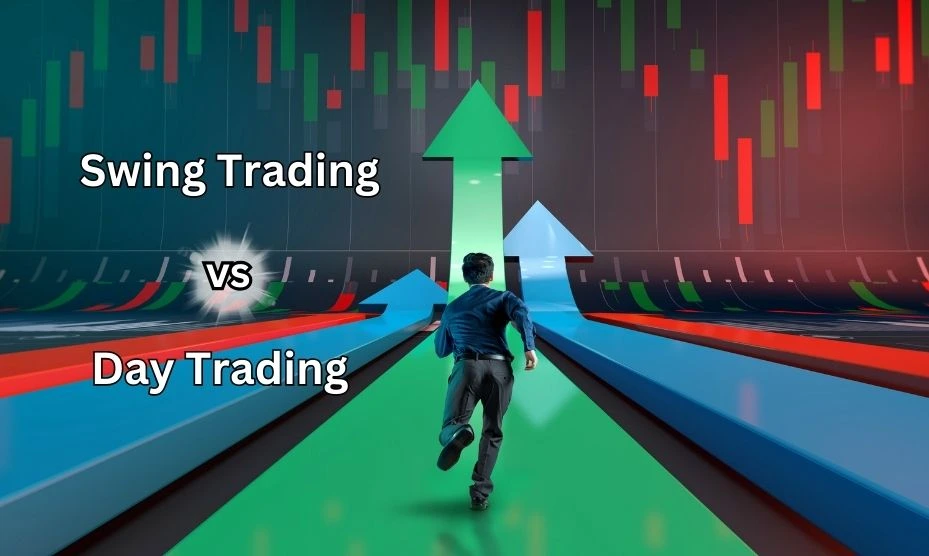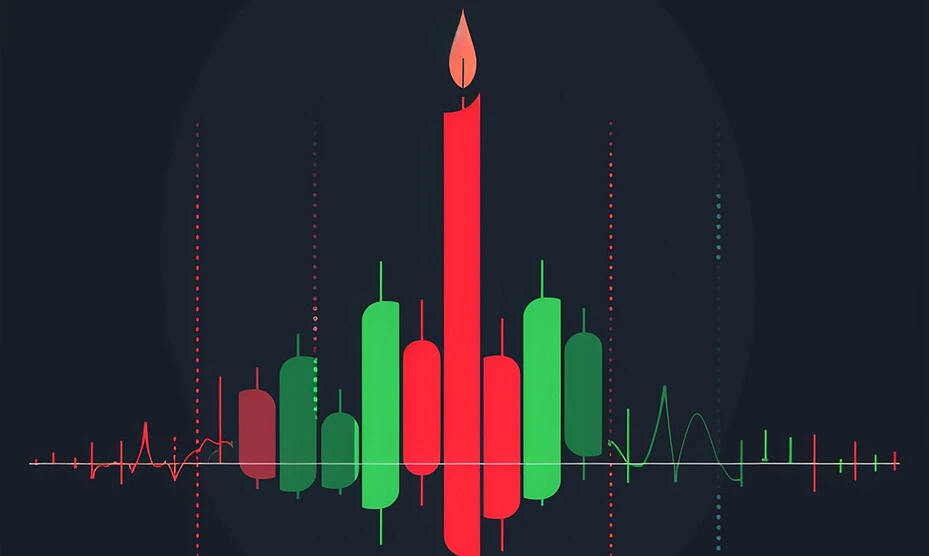
Swing Trading vs Day Trading
In the Indian stock market, Indian traders find two main types of trading appealing. It causes a debate about swing trading vs day trading. It is widespread in India among traders from all parts of the country. Not only are they available everywhere, but they also cater to different trade styles, goals, and commitments. Unfortunately, it becomes hard to choose between the two.
This blog makes your decision simple as we offer comparison points and show the core difference between swing trading and day trading.
What is Swing Trading?
It's okay if you're unfamiliar with the swing trading meaning, as most people are not!
It's a method by which traders buy and hold shares for anywhere between days or weeks.
The aim of keeping them for this long time is to capitalise on medium-duration price shifts. Swing traders who can't watch the market continuously can choose this option.
They will wait a long time when share prices have risen by much. It makes it better than intraday (day) trading, which needs your full attention!
What Do Swing Traders Do?
A swing trader will study the market and look for entry and exit positions. They will need to look at the market indicators and undertake fundamental or technical analysis to make a better decision.
Tools will be necessary to make profitable decisions. Since the time frame for swing trading is longer, traders have anywhere from days to weeks to time their trades.
Unlike intraday trading, these traders have more time and can use it while doing other work.
What is Day (Intraday) Trading?
The day trading meaning is a regular among Indian market participants as the trade is complete on a single trading day. Sellers must complete their share sales before the market closure.
The benefit of this method is that traders are safe from overnight price changes. If you haven't used this trading method, you can choose a technical analysis course online on intraday trading for beginners.
What Do Day Traders Do?
Day traders aim to gain from small price changes, and therefore, they make many trades daily.
They detect small price changes using various tools and regular checking. Traders must use advanced tools and platforms to find openings through day trading indicators. Either way, traders must find a platform with tools for quick decision-making!

Difference Between Swing Trading and Day Trading: Comparison Table
| Feature | Swing Trading | Intraday (Day) Trading |
|---|---|---|
| Holding Timeframe | Anywhere between days and weeks. | Same-day trading session. |
| Risk Level | Medium | High |
| Initial Capital | Medium | High |
| Monitoring | Irregular | Constant |
| Stress | Low | High |
| Tools | Trend analysis and moving averages. | Candlestick and volume analysis. |
| Profits | Profits take longer and are usually larger than day trading. | Profits are gathered faster but are of smaller amounts. |
Pros & Cons of Swing Trading
When looking at an intraday trading vs swing trading comparison, you can't ignore the pros and cons of each.
Pros:
- • There is less stress as constant market watching is not necessary.
- • It is suitable for starters as it involves fewer trades.
- • There is a chance for high gains as there is a longer time for price change.
- • Fewer trades mean lower fees and the ability to take more home gains.
Cons:
- • Since you hold shares for a while, the chances of losses due to news and other changes are higher.
- • It takes timing to get a profit.
- • Profits won't be possible from each trade, changing the swing trading success rate.
Pros and Cons of Day Trading
Pros:
- • Since trades start and end in a day, gains are faster.
- • This quick trade method poses no overnight risk as it's over in a single trading session.
- • With the best plans, you can get regular profits, especially if you have a SEBI-registered research analyst to help you.
Cons:
- • It takes time and energy to watch the market and choose an option.
- • Making more trades means more fees and less profits.
- • A poor trade can waste all your capital.
Common Swing Trading and Day Trading Mistakes to Avoid
Putting the debate of a day trade vs swing trade aside, avoiding common mistakes can help you succeed.
- • Overtrading
- • Poor Market Study
- • Not Protecting Your Capital
- • Using Emotions
It's vital to maintain discipline and not make too many trades unless they are suitable for a profit. Traders should avoid using their emotions to determine when to make a trade.
Failing to get the best technical indicators for day trading or swing shares will lead to losses. Learning to study the market is vital to make better choices.
Using a stop-loss order saves you from unnecessary losses. Regardless of where you stand in the day trading vs swing trading debate, stop-loss orders are helpful in both cases.
If you are not skilled in research and discipline, you can find an experienced stock market mentor to partner with. They would tell you to keep your feelings out of the decision-making process.
Which Gets More Profits: Swing Trading or Day Trading?
The differences and meanings are over, but you may have one more question, "Swing trading vs day trading: which is more profitable?"
Day trading vs swing trading profitability depends on a trader's style, knowledge, skills, and free time. Swing trading favours the beginner, while intraday options are for skilled people who love fast trades!
If you are still asking which is better, Swing trading vs day trading for beginners, the answer is the first option. It is because this trade type is easier to learn and has less stress.
But when it comes to gaining money, the answer depends on you! Intraday trading is more appealing to people with time and skills. But if you have other work and aren't as experienced, you should pursue swing trading.
Conclusion
Looking at the difference between day trading and swing trading is vital to determine which style fits you. Considering your skills, time, and flexibility will help you seal the winner in the debate of intraday trading vs swing trading.
For starters who have time but not skills, swing trading is better. However, a skilled specialist will look for fast gains, and intraday trading can provide these. Anyone still asking, "Is swing trading profitable," the answer is yes!
Are you ready to discover which strategy will work better for you- swing or day trading? Contact us for expert guidance that puts your financial goals in perspective.
FAQs
-
What's the vital difference between swing and day trading?
A core difference between swing trading and day trading is evident in the holding share time. You can keep them for days to weeks in the swing option but no longer than a trading session for the other option. -
Is swing trading better than day trading?
Anyone looking for an answer should look into their needs to decide. If you want flexibility and are new to the stock market, this trade type is better than intraday trading. -
What strategy is better for short-term gains: swing or day trading?
Based on the trading style, intraday trading will give you faster gains. However, one should note it comes with more chances of a loss. -
Can I switch between swing and intraday trading?
Yes, it is possible, and many experts would tell you to use both! But you must have the skills and knowledge to do both and win. -
Can I use swing or day trading with a part-time schedule?
Since the first option comes with lower time and effort needs, it is best for a part-time schedule. It allows you to balance your stock market activities and other work. -
Is the swing trade option suitable for new traders?
It is ideal for beginners as it is a slower trade method with less stress. It allows you to learn more while using your knowledge and testing your strategy.


